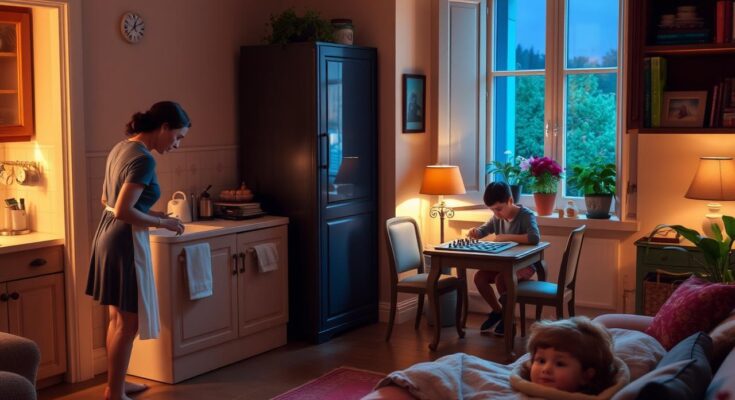**Thursday, 12th October**
The evening in our cosy home in York was peaceful and still. I, Charlotte, had just finished washing up after supper while my husband, Thomas, played chess with our son, Oliver, and our younger daughter, Emily, tucked her dolls into bed. Then came the sharp ring of the doorbell—a sound that would unravel everything. My mother, Margaret, stormed into our lives with accusations that turned everything upside down. Her words about conscience and inheritance still echo in my ears, and the sting of unfairness weighs heavy on my heart.
Thomas and I exchanged glances—we weren’t expecting visitors this late.
“Perhaps the neighbours?” he suggested, heading for the door.
But there stood my mother, Margaret, her expression sharp as a blade.
“Mum?” I asked, surprised. “What’s wrong?”
“Wrong? Plenty!” she snapped, striding straight to the kitchen. “I thought you’d have realised by now, but clearly not!”
“What are you talking about?” I asked, unease creeping in.
“What about your conscience?” she fired back. “Have you no intention of sharing?”
“Sharing? Sharing what? Mum, just explain!”
Thomas, sensing trouble, quietly returned to Oliver, leaving us alone.
“Would you like some tea?” I offered, grasping for calm.
“Water will do,” she muttered, tone leaving no room for pleasantries.
“What about your conscience?” she repeated, narrowing her eyes. “When do you plan to share?”
“Mum, I genuinely don’t understand. Just say it plainly!”
“You’ve inherited from Aunt Victoria—the flat, the country house, the savings—yet you’re keeping it all to yourself! Is that fair?” she finally spat out.
I froze. Nine months ago, my Aunt Victoria—Mum’s sister—had left me everything in her will. It was her decision, and I’d accepted it, knowing I’d cared for her through her final years.
“Why should I share what Aunt Victoria chose to leave me?” I countered.
“How noble!” she huffed. “A London flat, a cottage in the Cotswolds, thousands in savings—all for you! Meanwhile, I’m her sister, her rightful heir! We didn’t always get on, but that doesn’t mean you should take everything. And your sister, Sophie—does she get nothing?”
“Mum, legally, you’d only have a claim if you were retired and dependent on Aunt Victoria. But you’re still working! And Sophie? She’s irrelevant here,” I said firmly.
“So you’ll keep it all?” Her voice trembled with anger.
“Why shouldn’t I? When Sophie won £50,000 in the lottery three years back, did she share a penny?”
“Don’t compare the two! Fifty grand and your inheritance—it’s night and day!” With that, she stood, slammed the door, and left.
I sat there, stunned. Sophie and I had always been different—I was five years older, trained as a GP at a private practice, while she married straight out of school, had two boys, William and Henry, and never worked a day. Thomas and I had moved into the house his parents helped him build. When Oliver and Emily came along, my mother-in-law, Patricia, stepped in, caring for them so I could finish my studies. Without her, we’d have drowned.
Mum always acted as though life handed me everything, while Sophie struggled. Sophie still lived in our parents’ home—every spare penny went to her. Aunt Victoria’s will had lodged itself like a splinter in Mum’s mind. She truly believed I owed Sophie half.
“Charlotte, sharing with Sophie is the decent thing to do,” she pressed later.
“Fine, Mum. What about your house? Who gets that?”
“That’s Sophie’s share—don’t even think about it,” she said flatly.
“Why not split it?”
“Because you already have a home!”
“That’s Thomas’s family home. What’s left for me?”
“You’ve got everything—a house, children, Patricia’s help. What more do you need?”
“None of that is yours! The house is from Thomas’s parents. Patricia gave up work to help us. When have you ever looked after Oliver or Emily?”
“Your father and I raised you,” she shot back.
“And Sophie. And you’re still raising her. Now you want to take what’s rightfully mine. How often did Sophie visit Aunt Victoria when she was ill? Who took her to hospital? Me—not Sophie!”
“What will you do with it all, then?”
“The cottage needs work—Patricia and the children will stay there this summer. The flat? We haven’t decided.”
“Then let Sophie and her family move in! They’ll cover the bills.”
“No. If we rent it, not to Sophie. They could get a mortgage if they want independence.”
“And with what income?”
“Sophie could work—the boys are big enough now.”
“Doing what? She’s got no qualifications.”
“So she’ll just wait for handouts till retirement?”
“Not everyone’s as lucky as you, with your degrees and career.”
“Lucky? I worked for this! Sophie could’ve gone to college, but she chose marriage—with your blessing. Now you blame me? It’s not too late for her to train.”
“Train? She’s expecting her third! You must help her!”
“You know what, Mum? If sense were rain, some people’d never get wet. We’re done.”
The silence afterwards was thick, the hurt lodged deep. Why should I surrender what I’ve earned through care and effort? My family, my home, my life—they’re built on Thomas’s and my work. Yet Mum demands I sacrifice for Sophie, who never lifted a finger. This rift cuts deeper than I can say.
**Lesson learnt: Fairness isn’t always found in blood. Sometimes, the loudest cries for justice come from those who’ve given none.**

